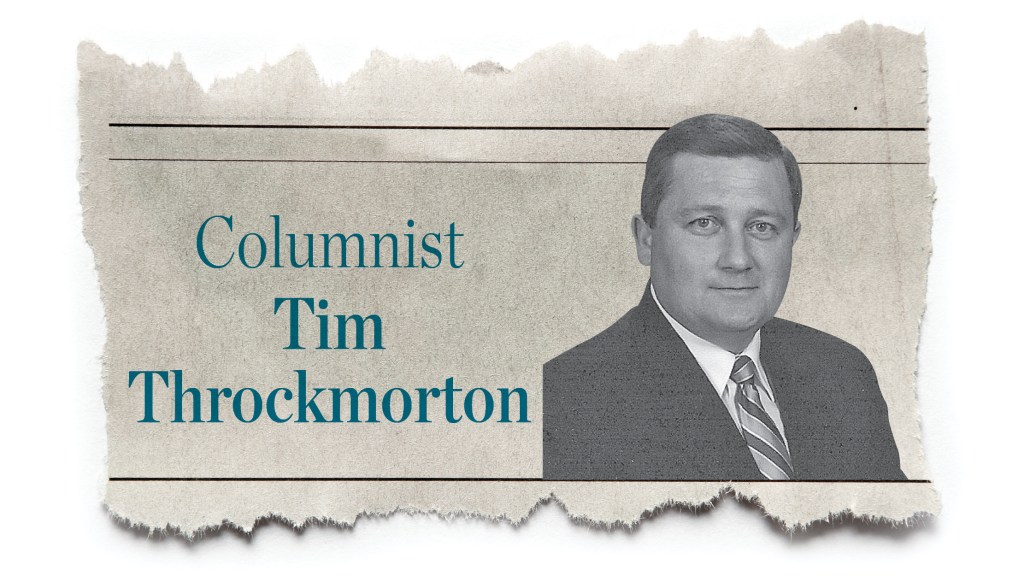Tim Throckmorton: A way with words
Published 12:00 am Sunday, September 17, 2023
A few years ago, I found myself in Augusta Maine, where I was speaking at a Pastors event.
Upon arrival, some of the attendees remarked that I looked nothing like the Tim Throckmorton they knew, who just happened to be a sportscaster in Bangor.
So, I asked the audience, “who do I look like?”
One dear sweet lady spoke up and said, you look like Mike Douglas, but you talk like Jimmy Dean! And I thought they talked funny!
Sometimes it’s not the accent, but the reality that in different parts of our beautiful country words can mean different things.
According to the Dictionary of American Regional English, words are a many splendid thing.
For Example, in Wisconsin a bubbler is a drinking fountain, in Tennessee and Kentucky a dry-land fish is an edible mushroom.
Heavy rains can be categorized as toad stranglers in the deep south, fence-lifters in the Ozarks. Also, what you call a carbonated soft drink, whether soda, pop or coke, provides a clue about where you grew up. I just love words, don’t you?
I am told that of the over 800,000 words in the English language. 300,000 are technical terms. The average person knows 10,000 words and uses 5,000 in everyday speech. A journalist knows approximately 15,000 and uses around 10,000. That leaves a lot of words that never see the light of day. Words however are very important.
From Daily in the Word we find the story of Professional golfer Tommy Bolt who was playing in Los Angeles and had a caddy with a reputation of constant chatter.
Before they teed off, Bolt told him, don’t say a word to me. And if I ask you something, just answer yes or no. During the round, Bolt found the ball next to a tree, where he had to hit under a branch, over a lake and onto the green.
He got down on his knees and looked through the trees and sized up the shot.
What do you think? he asked the caddy. Five-iron? No, Mr. Bolt, the caddy said. What do you mean, not a five-iron? Bolt snorted. Watch this shot. The caddy rolled his eyes. No-o-o, Mr. Bolt. But Bolt hit it and the ball stopped about two feet from the hole.
He turned to his caddy, handed him the five-iron and said, Now, what do you think about that? You can talk now. Mr. Bolt, the caddy said, that wasn’t your ball. You see, words are important!
God used words to create. “In the beginning God created the heaven and the earth. And the earth was without form, and void; and darkness was upon the face of the deep. And the Spirit of God moved upon the face of the waters. And God said, let there be light: and there was light. And God saw the light, that it was good: and God divided the light from the darkness. And God called the light Day, and the darkness he called Night. And the evening and the morning were the first day. And God said, let there be a firmament in the midst of the waters, and let it divide the waters from the waters. And God made the firmament, and divided the waters which were under the firmament from the waters which were above the firmament: and it was so. And God called the firmament Heaven. And the evening and the morning were the second day. And God said, Let the waters under the heaven be gathered together unto one place, and let the dry land appear: and it was so. And God called the dry land Earth; and the gathering together of the waters he called Seas: and God saw that it was good.”
Over and over in this first chapter of the Bible we are told that “God said”, and boy when God spoke, things happened! But did you notice it was all good?
Located toward the end of the book of John, we find these words, “And many other signs truly did Jesus in the presence of his disciples, which are not written in this book: But these are written, that ye might believe that Jesus is the Christ, the Son of God; and that believing ye might have life through his name.” God wonderfully inserts in his book, for all of us to hear, the intention behind all that is written. That we might have a personal relationship with Jesus Christ.
Our words hold great significance. What we do with them, how we use them, what we say and how we say it. But perhaps more important are the words of God. What we do with them, how we use them and how we respond to what God says.
From Moody Institutes, Today in the Word we find the story of a businessman well known for his ruthlessness once announced to writer Mark Twain, “Before I die I mean to make a pilgrimage to the Holy Land. I will climb Mount Sinai and read the 10 Commandments aloud at the top.” “I have a better idea,” replied Twain. “You could stay at home and keep them.” Do you have a way with words? Or better yet, does God’s word have its way with you?
Tim Throckmorton is the national director of Family Resource Council’s Community Impact Teams.






